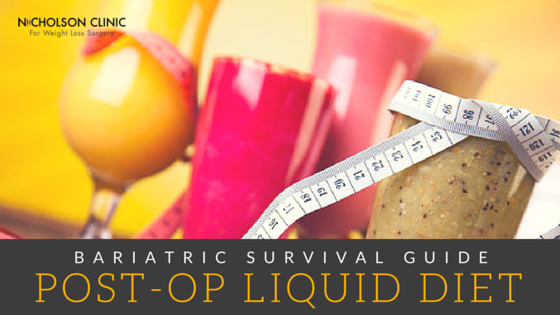
By Sheri Sellars, RN, Nicholson Clinic Nurse Educator
Smart food choices following bariatric surgery are critical to your health and success. It is important to follow all diet guidelines to help you shed pounds after surgery and maintain a healthy weight for life.
Beginning right after weight loss surgery, you will begin the first phase of your post-op diet — the liquid phase. This diet phase can be the most difficult as your body is recovering from surgery and you are adapting to your new way of life. The lack of variety in the liquid diet can be challenging and even frustrating. Here are some helpful tips to get you through the liquid diet and ensure you are getting proper nutrition.
Protein, Protein, Protein
During this phase of your post-op diet, you should be consuming a daily minimum of 60 grams of protein. Protein drinks should make up the majority of your fluid intake. Be sure your protein drinks contain at least 25-30 grams of protein per serving — any less than that is ineffective.
Acceptable Drinks and Liquids
In addition to protein shakes and drinks with 25-30 grams of protein (or more) per serving, other acceptable liquids include: broth or stock (stock is more hearty); Crystal Light; unsweetened almond milk or soy milk; sugar-free popsicles (not fudgesicles!); G2 and Powerade Zero; and decaf tea or coffee with unsweetened creamer.
When it comes to broth or stock, homemade tastes much better than canned. Bone broth contains numerous minerals and vitamins that can help improve your overall health. (Read more here.)
Check out these recipes for a delicious and nutritious homemade broth and stock:
• Alton Brown’s Chicken Stock
• The Pioneer Woman’s Beef Broth
Drinks and Liquids to Avoid
Just because it is a liquid doesn’t mean it is good for you or should be consumed during this critical phase of your post-op diet. Avoid acidic products such as lemon and tomato products (tomato juice, V8, tomato soup, etc) as these will cause stomach pain.
Fruit juices (even watered down fruit juices) should also be avoided as they are high in sugar and calories an void of any real nutrition. Diet fruit juices are also very acidic and, like tomato products, can cause stomach pain.
It is recommended to avoid cream-based soups for the first 14 days after weight loss surgery. Milk products can be difficult for the stomach to digest, resulting in stomach pain.
Carbonated beverages will destroy your new sleeve or pouch and should never be consumed at any time after weight loss surgery. This means leaving sodas, sparkling juices, water and beer in your past.
No Cheating Allowed
Eliminate the word “cheating” from your vocabulary. Cheating during this phase of your post-op diet can have life-threatening implications. Most patients will experience hunger by the end of the liquid phase. It is a sign you are healing well. However, it is still important to stick to liquids only for the full 21 days.
Acknowledge Your Emotions
Food is an emotional stronghold for many people, which often leads to obesity. We eat when we’re grieving, depressed, celebrating or just plain bored. Breaking the link between food and emotions can be very challenging, but is a critical step on your journey.
You have made a decision that will impact you for life. While your new lifestyle is for your overall health and happiness, the permanence of this change doesn’t come without its fair share of emotions. After the excitement settles down, the reality settles in. There can be a mourning period for how you used to live. This is healthy and normal, as long as you use this as the launching pad to change your life.
Recognize that you will be emotional, and it’s perfectly normal. Hormones are stored in body fat and during this phase, you will be burning fat at a very rapid pace, releasing these hormones into the blood stream to be processed by your body.
Other Survival Tips
• Sip all day long, particularly your protein drink and homemade stock.
• Don’t watch evening television, and avoid watching any cooking shows or The Food Network.
• Don’t watch your family eat if it bothers you.
• Stay active and busy.
• Avoid social situations that revolve around food.
Most importantly, remember you will eat real food again. The liquid phase only lasts 21 days. You can do anything for three weeks! The staff at Nicholson Clinic is committed to being With You All The Way. If you are struggling, have questions or need encouragement, we are here to help!
For encouragement and support from others on the same journey, join our Facebook Patient Support Group. Click here to join the private group.












